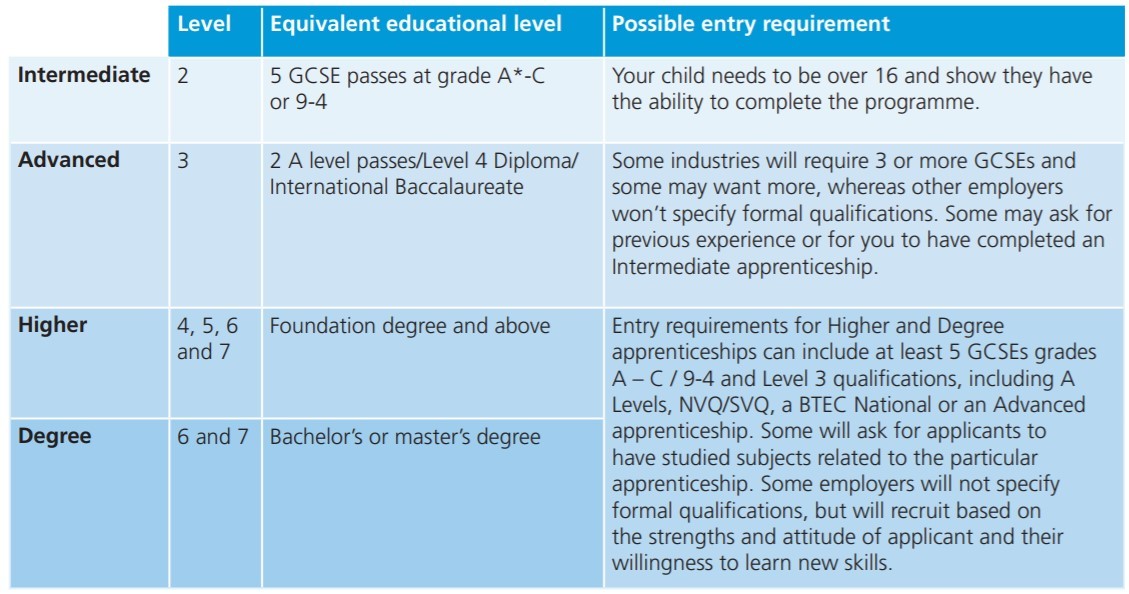Apprenticeships
What is an apprenticeship?
An apprenticeship is a real job with training which would allow you to earn while you learn, whilst gaining a nationally-recognised qualification. Apprenticeships take between one and five years to complete and are available in 1,500 occupations across 170 industries varying from construction to manufacturing through to IT and the creative and digital sectors.
This short animation explains what apprenticeships are, the levels, areas of study and how to search for a vacancy.
Apprenticeship levels
There are various levels of apprenticeship you could apply for depending on your current skills and qualifications. Apprenticeships have equivalent educational levels:

All apprenticeships will include elements of on-the-job and off-the-job training leading to industry-recognised standards or qualifications. Some apprenticeships will require an assessment at the end of the programme to assess the apprentice's ability and competence in their job role.
Benefits of doing an apprenticeship
- Earning a salary
- Training in the skills employers want
- Excellent progression opportunities, whether looking to study further or climb the ranks within the workplace
- Increased future earning potential
- Apprentices enjoy marked salary increases when they complete their training, and those completing a higher apprenticeship could see increased earnings of an estimated £150,000 over their lifetime
- Learning at a pace suited to the individual with the support of a mentor
- Paid holiday
Entry requirements
Apprenticeships are available to anyone over the age of 16 living in England. There are different entry requirements depending on the sector and job.
Salaries
The minimum wage for apprentices is £7.55** per hour, but many employers pay more than this. This is dependent on the sector, region and apprenticeship level eg some higher apprenticeships can pay as much as £300 - £500 per week. More details on salaries and entry criteria in specific apprenticeship occupations can be accessed by looking at the vacancies on Find an apprenticeship.
** wage rates change annually check https://www.gov.uk/national-minimum-wage-rates for updates.
Search for apprenticeships:
The following websites have search tools to help you find apprenticeships that suit you:
Government apprenticeship website
Unifrog (Unifrog scans a number of search engines and consolidates results)
Useful resources:
Interactive student guide packed with checklists, short films and areas for you to write your notes about apprenticeships.
The Apprenticeship Guide website is a one-stop introduction to the world of apprenticeships in England.
Parents and Carers Pack Apprenticeship Information
Information for parents and students: https://www.apprenticeships.gov.uk/#
To help families and students navigate the fast-changing world of apprenticeships. https://amazingapprenticeships.com/
Apprenticeships, job reviews and careers advice for school and college leavers: https://www.ratemyapprenticeship.co.uk/
An apprentice employer ranking based on apprentice feedback https://www.thejobcrowd.com/top-company-guides/
Degree Apprenticeships
Degree apprenticeships enable you to gain a full undergraduate or master’s degree while you work. Degree apprenticeships take three to six years to complete, depending on the course level.
You’ll spend most of your time working and you’ll also study part-time at university. For example, you might go to university one or two days per week, or in short blocks, such as a week at a time. Overall, you spend about 20% of your time studying vs. 80% of your time working.
You apply to the employer who then contracts with a univeristy for the academic content. Vacancies and application windows arise throughout the year and vary employer to employer so you need to keep up to date with your research using the search engines above and specific employer websites. At The Misbourne we signpost students to a lot of vacancies on the Year 13 GoogleClassroom.
Degree apprenticeships are very popular and competiton is high. Students will need to produce an excellent CV and LinkedIn profile, and go through a rigorous selection process; usually including recorded interviews; group assessment centre workshops; psychometric testing and skills based testing - all of which we practise on Year 12 and 13 Careers Days.
The UCAS website provides information about the apprenticeships and discusses advantages and disadvantages of following this career path.
The Sixth Formers' Guide to Degree Apprenticeships is a free 100-page digital guide, produced in association with the Department for Education and The Careers & Enterprise Company, that will help introduce Year 12 students to degree apprenticeships and the employers who offer them.
Rate my Apprenticeship provides a wealth of information about degree apprenticeships.
What is a Degree Apprenticeship? A 3-minute explanation of how degree apprenticeships provide an earn-as-you-learn university degree or professional qualification.
Which Degree Apprenticeships are Available? A 2-minute guide to the many different degree apprenticeships currently available to sixth-form school-leavers, from engineering and technology to law, accounting and business & management.
University or a Degree Apprenticeship? A 3-minute comparison of the traditional university experience, with the debt-free work-based route to the graduate job market that degree apprenticeships offer.
Meet the Degree Apprentices Interviews with current degree apprentices working at at professional services firm BDO and banking & finance group JPMorganChase.
Expert Advice & Guidance Discussion with senior apprenticeship recruiters from accounting & professional service firms KPMG and PwC.
Focus on Engineering With senior apprenticeship recruiters from engineering companies Rolls-Royce and AtkinsRéalis
Q&A Entry requirements for degree apprenticeships, how they are funded, and whether degree apprenticeships really offer an equivalent qualification to a traditional university degree
If you need support:
Email Mrs Hill on hhill@themisbourne.co.uk and we will arrange for a careers appointment for you to help answer your queries.
Local employers send vacancies through to the school which we post on the Year 13 Google Classroom.
Documents
| Apprenticeships newsletters |
|---|
| Apprenticeships advice and opportunities Dec 22 / Jan 23 |
